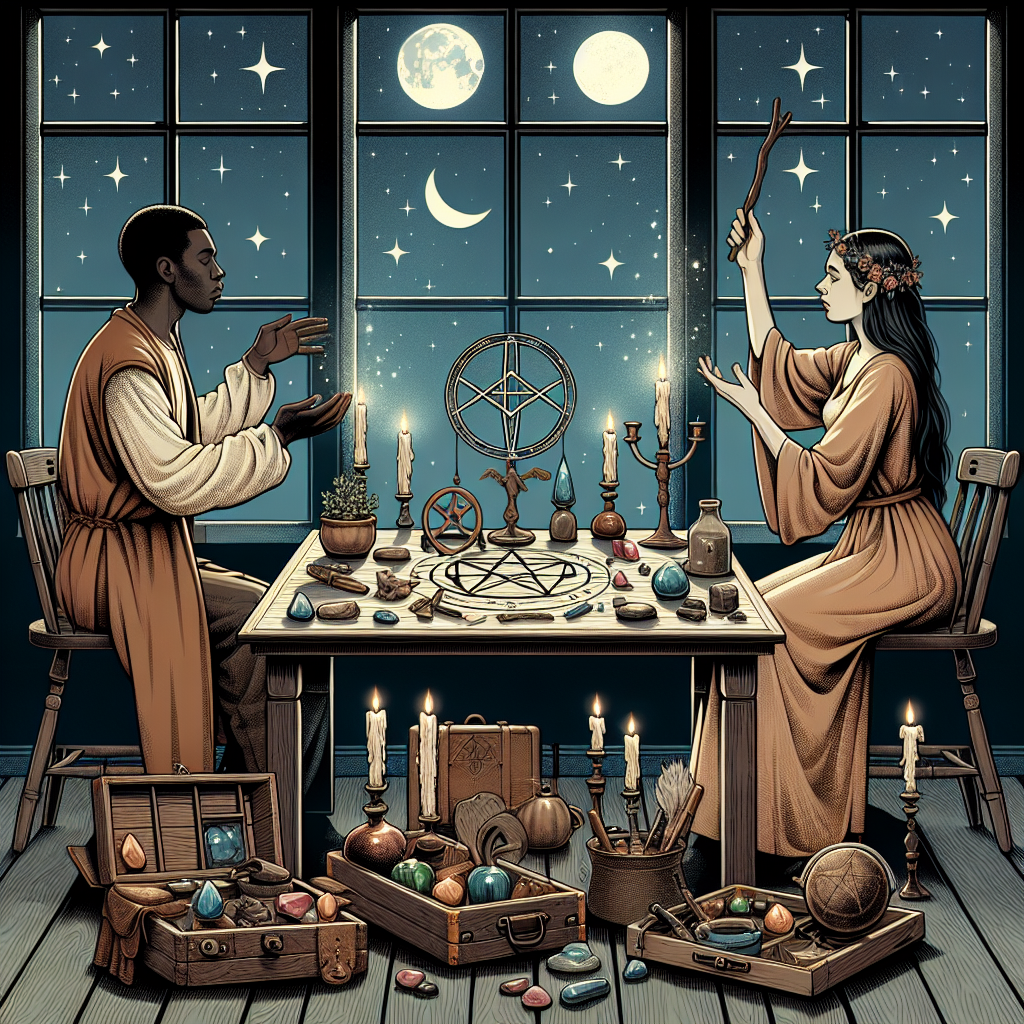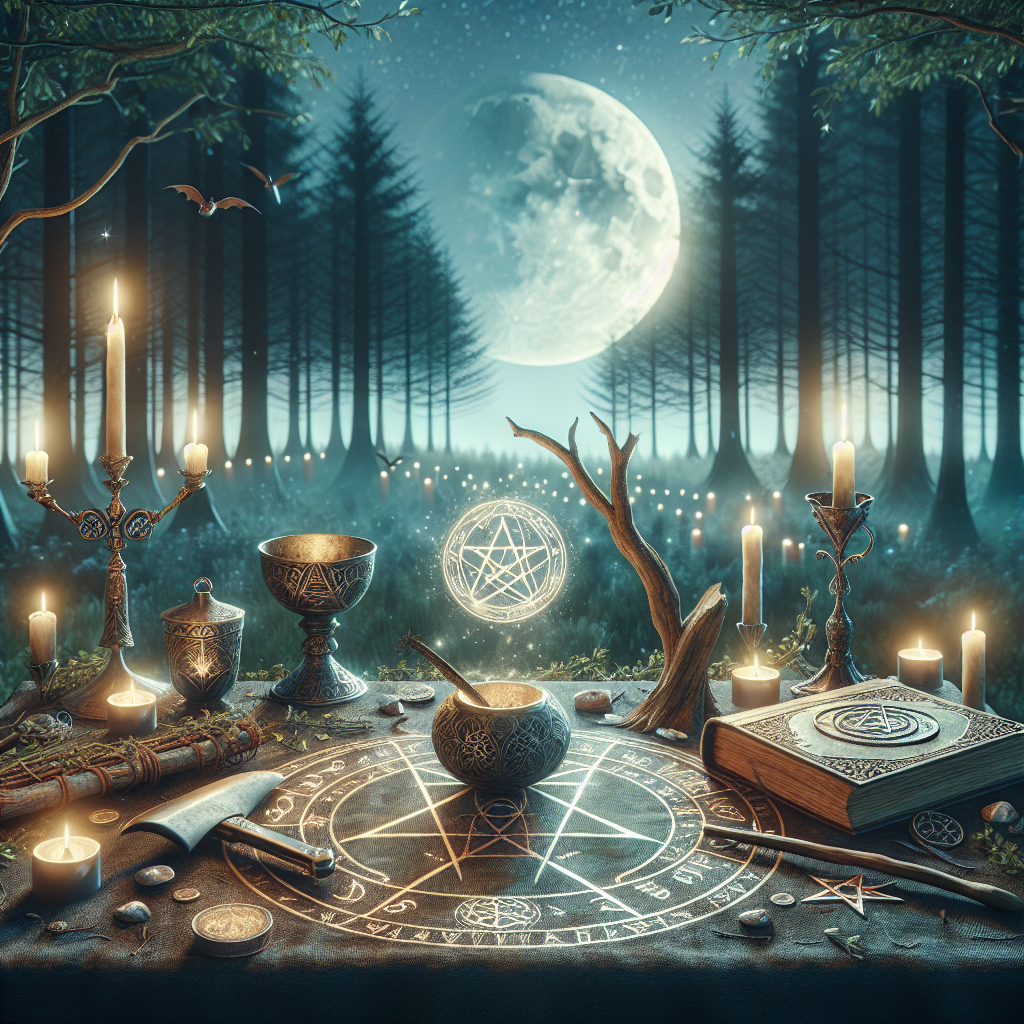As an Amazon Associate I earn from qualifying purchases.

Wicca, a modern Pagan religion that celebrates the Earth and nature, is known for its enchanting rituals and magical practices. Emerging in the mid-20th century through the works of Gerald Gardner and others, Wiccan traditions have evolved from ancient pagan practices and folk magic. Central to many Wiccan practices are spells—structured intentions to bring about change, guided by the Wiccan Rede’s ethical axiom, “An it harm none, do as ye will.”
Spells in Wiccan belief are akin to prayers or affirmations used in other spiritual paths. They are crafted using symbolic actions, words, and materials like candles, herbs, and crystals to focus the practitioner’s intent and channel energy toward a desired outcome. This outcome could range from healing and protection to love and prosperity. The casting of a spell is typically conducted within a consecrated circle, offering a sacred space where the practitioner can work in harmony with the elemental forces and deities.
Wiccan spells hinge on the principle of the “Threefold Law”—the idea that whatever energy a person puts out into the world, be it positive or negative, will be returned to them threefold. Consequently, spellwork is approached with great responsibility and respect. The practice is also tied to the Wheel of the Year, with certain spells being more potent when aligned with the energies of specific seasonal festivals like Samhain or Beltane. Moreover, the phases of the moon are pivotal in Wiccan spellcraft, with the waxing moon being considered particularly auspicious for spells of attraction and growth, and the waning moon for banishing or release.
While many practitioners of Wicca keep their magical workings private, there is also a communal aspect to spellcraft. Covens or groups may come together during Esbats or Sabbats to perform more elaborate rituals and spells for the benefit of the community or the wider world. Among many Wiccans, the most compelling statistic is personal: they report that integrating spellwork into their spiritual practice enhances their connection to the environment, empowers their personal growth, and helps foster a sense of control and positivity in their lives.
Despite common misconceptions, Wiccan spells are not about coercion or manipulation. Instead, they reflect a deep reverence for free will and personal responsibility. By integrating elements from natural surroundings and focusing on personal intentions, Wiccans believe that spellcasting can weave positive change and harmony not only into the practitioner’s life but also into the broader fabric of the universe.
html
Discovering Wiccan Spells: How Do They Work in Magical Rituals?
Wiccan Spells are an integral part of Wiccan practices, rooted in the ancient traditions of nature-based magic. They often involve the use of natural elements, symbols, chants, and rituals to manifest intentions and bring about change. This magical framework honors the connection between the natural world and the spiritual realm, empowering practitioners to work in harmony with universal energies for healing, protection, prosperity, love, and more. Bridging the gap between the physical and metaphysical, Wiccan spells can vary widely in complexity and intent, reflecting the diverse paths and ethics within the Wiccan community. Through focused intent and adherence to the Wiccan Rede – which advises to harm none – these spells are crafted to align one’s personal energy with desired outcomes, all while respecting the free will of others. In the next section, we delve deeper into the history, techniques, and ethical considerations that shape the crafting and casting of Wiccan spells, providing a more comprehensive understanding for both seasoned practitioners and curious newcomers.
Wiccan Spells: Understanding Their Nature and Purpose
Wiccan spells are rituals and invocations practiced within Wicca, a modern pagan, witchcraft religion. This form of spellcasting is grounded in the belief that the universe is filled with energies that can be harnessed and directed through the power of intention, will, and ritual. Practitioners, commonly known as Wiccans, adhere to the Wiccan Rede, an ethical code that includes the principle “An it harm none, do what ye will,” which promotes the positive, non-malicious use of magic.
The Role of Nature and Deity in Wiccan Spells
Wicca is deeply rooted in the reverence for nature and the duality of the divine, often represented by a Goddess and a God. Spells often honor these deities and may call upon them for guidance and power. Moreover, these spells are frequently timed to coincide with natural cycles, such as phases of the moon or Sabbats, which are Wiccan festivals that mark the changing seasons and agricultural cycles.
Components and Tools in Spellcasting
Wiccan spells incorporate a range of tools and components that carry symbolic meaning and are believed to hold specific energies. Common tools include the athame (ceremonial knife), the wand, the pentacle, the chalice, and the cauldron. Herbs, crystals, candles, and oils are also often used to enhance the practitioner’s focus and to represent the elements of earth, air, fire, and water.
The Structure of a Wiccan Spell
A typical Wiccan spell begins with a process called “casting the circle,” which serves to create a sacred and protected space for the practitioner. Following this, a spell might include the invocation of the elemental powers or deities, the stating of the spell’s purpose, and the visualization of the desired outcome. Chanting, the use of affirmations, and the performance of symbolic actions are also common components. Spells are usually closed with a statement of thanks to the invoked energies and the formal closing of the circle.
Ethics and the Threefold Law
Ethical considerations are central to performing Wiccan spells, prominently featuring the Threefold Law or The Rule of Three, which suggests that whatever energy a person puts out into the world, whether positive or negative, will be returned threefold. Consequently, spells intended to control, harm, or manipulate others are generally avoided in Wiccan practice.
Variety of Spells
There is a vast array of Wiccan spells that cater to various intentions, from those seeking love, protection, or healing to those aiming to promote prosperity, clarity, or spiritual growth. The diversity reflects the individualistic nature of Wicca, where spellcraft is often a personal and intuitive practice.
Effectiveness and Personal Empowerment
While the effectiveness of Wiccan spells is a matter of personal belief and experience, many practitioners claim that spellcasting has brought significant changes to their lives. Critics argue that spellcasting may simply enhance a person’s focus or provide psychological comfort. Nevertheless, for Wiccans, spells are an integral part of their spirituality and a form of personal empowerment.
In recent years, the interest in Wiccan spells and witchcraft has seen a resurgence, with the Pew Research Center reporting in 2014 that 0.4% of the American population identified as Wiccan or pagan. This figure highlights the continuing relevance and growing acceptance of Wiccan practices in contemporary society.
Wiccan spells are rituals and practices within the Wiccan religion that involve the use of magick to bring about desired changes in one’s life, environment, or within oneself. They are based on the belief in the interconnectedness of all things and often involve calling upon deities, elemental forces, or the energy of the Earth.
Wiccan spells work by focusing the practitioner’s will and intent, combined with the manipulation of natural energies and the use of symbolic materials, to create a desired change. It’s believed that spells align the universe’s energy with the caster’s desired outcome, thereby manifesting it into reality.
Generally, Wiccan spells are considered safe if performed with good intentions and an understanding of the spell’s components. Wiccans follow the Wiccan Rede, “An it harm none, do what ye will,” which advises against any spells that could cause harm to oneself or others.
No, you don’t need to identify as a Wiccan to cast spells. However, understanding Wiccan beliefs, values, and the significance behind the rituals is important for effective spell work and respecting the religion’s practices.
Yes, beginners can perform Wiccan spells. It’s suggested to start with simple spells and gradually progress to more complex rituals as one gains more knowledge and experience in the craft.
The materials needed can vary widely depending on the spell. Typical spellcasting items include candles, herbs, crystals, wands, athames (ritual knives), and pentacles, but spells can also be performed with everyday items or even with no physical materials at all.
You can learn Wiccan spells from a variety of sources, including books, online forums, social media groups, local covens, or by finding a mentor experienced in Wicca who is willing to teach you.
Knowing if a spell has worked can be subjective, as results can be subtle and not always immediate. Signs of success could be a sense of peace, the occurrence of synchronicities, or changes in the situation that align with the spell’s intent. The key is to trust in the process and remain open to possible outcomes.
While it is not common, spells can backfire if the intent behind them is not clear, if there is negative energy present, or if they are cast with ill intentions. It’s crucial to perform spells with a clear and focused mind and to follow the Wiccan Rede to avoid unintended consequences.
Yes, ethics play a central role in Wicca. It’s important to consider the potential impacts of a spell on others and to avoid manipulative or harmful intentions. Respecting free will, causing no harm, and considering the possible karmic consequences of spellcasting are all ethical considerations for Wiccans.

Conclusion
Wiccan spells, as explored throughout the guide, are a core aspect of the Wiccan tradition, acting as a conduit for practitioners to express their spirituality and enact change through the manipulation of energy in accordance with their will. These spells are crafted with a combination of symbolic actions, spoken words, and the use of natural elements such as herbs, stones, and crystals, reflecting the Wiccan reverence for nature and the belief in the interconnectedness of all things. With a diverse range of spells tailored for various purposes such as healing, protection, love, and prosperity, Wiccans are empowered to engage with the world around them in a deeply personal and impactful manner, aligning their intentions with the Wiccan Rede’s guidance to harm none.
Understanding the principles of Wiccan spells, including the threefold law which posits that any energy sent out into the world will return threefold, is crucial for the ethical practice of Wiccan magic. The spells performed within this tradition are not only rituals but also serve as a form of self-discovery and personal growth, urging practitioners to contemplate their motivations and the potential consequences of their magical workings. Whether one is a solitary practitioner or part of a coven, the responsibly executed Wiccan spells underscore a commitment to personal responsibility, spiritual evolution, and the fostering of harmony within the tapestry of the living universe.
Amazon and the Amazon logo are trademarks of Amazon.com, Inc, or its affiliates.
Continue Your Magical Journey
Free Witchcraft Starter Kit
Get 6 free printable PDFs: grimoire pages, moon calendar, spells, crystals, herbs, and tarot journal.
We respect your privacy. Unsubscribe anytime.
Enhance Your Practice
As an Amazon Associate, I earn from qualifying purchases.

